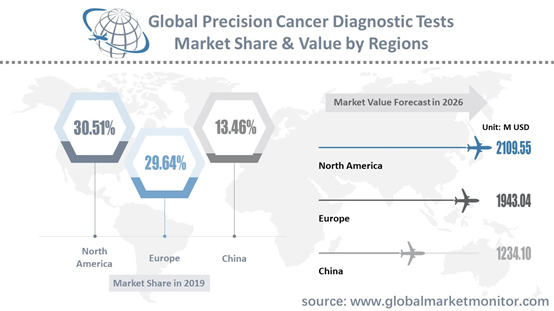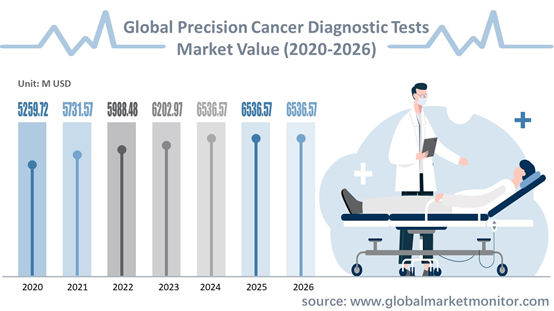Cancer has always been one of the most fatal diseases in the world. In recent years, more and more people are suffering from cancer due to poor lifestyle and dietary habits, so precision cancer diagnostic tests have started to receive attention. Precision cancer tests can be divided into imaging, molecular, cytology, tumor marker immunoassays and POC colon cancer tests. The three types of imaging, molecular and cytology tests have larger market shares.
Imaging is not only used for cancer detection, but is also important for the extent and precise location of cancer progression, to help guide surgery and other cancer treatments, and to check for cancer recurrence. Imaging technology is now an important part of early detection of many cancers, accounting for 52.25% of the market share. Its market value has reached $2,748.21 million in 2020.
Molecular diagnostics are at the heart of healthcare, providing insights into the underlying molecular mechanisms of disease to assess a personal risk of developing a disease, screen for diseases that are present but not yet symptomatic, provide a diagnosis of existing symptoms, or monitor the response of patients to treatment for a disease. Its market value has reached $1401.19 million in 2020.
Cytology is also a type of precision cancer diagnostic tests. Normal human cells have 46 chromosomes. Certain types of cancer have one or more abnormal chromosomes. Identifying abnormal chromosomes can help identify the type of cancer. Sometimes, the tests can even help predict which chemotherapy drugs the cancer may respond to. The market has been valued at $639.58 million in 2020.
In Precision Cancer Diagnostic Tests market, the Hospital holds an important share in terms of application, and it is expected to generate revenue of $4985.1 million by 2026, up from $3626.68 million in 2020.
Global Precision Cancer Diagnostic Tests Market Status and Prospect Analysis

North America is the largest revenue market, with a market share of 31.17% in 2015 and 30.51% in 2019, a decrease of 0.66%. The US is the largest market for precision cancer diagnostic tests due to its high level of health spending, well-developed healthcare system, and public emphasis on health. The market value in North America is expected to increase from $1613.49 million in 2020 to $2109.55 million by 2026.
Get the complete sample, please click: https://www.globalmarketmonitor.com/reports/762543-precision-cancer-diagnostic-tests-market-report.html
Europe has the second largest market share with 29.64% in 2019. Europe has a developed economy, a world-class healthcare system, and high level of science and technology. Therefore, the European market is expected to expand further during the forecast period. Increasing adoption of precision diagnostic tools and electronic medical records are expected to drive the growth of the market in the region. The market in Europe is expected to reach a value of $1,943.04 million by 2026.
In addition, the China precision cancer diagnostic test market is expected to be a growing market. The market for precision medicine treatment in emerging countries such as Asia Pacific and Latin America is expected to show strong growth due to increasing awareness of the importance of precision medicine for the treatment of various diseases and increasing healthcare revenues and expenditures. Government initiatives to improve infrastructure and patient care are also expected to support the market growth. The market value in China is expected to be $1234.1 million by 2026, up from $731 million in 2020.
With the Continuous Development of Medical Science, the Global Precision Cancer Diagnostic Tests Market Will Continue to Grow

According to research, the total revenue of the global precision cancer diagnostic tests market in 2015 was $4,762.04 million, and increase to $5,259.72 million by 2020. The market for precision cancer diagnostic tests is projected to reach $7281.42 million by 2026, with a CAGR of 5.57% from 2020 to 2026.
Since the completion of human genome sequencing in 2003, the focus of the healthcare industry has shifted to personalized medicine, also known as precision medicine or personalized medicine. This technological development provides opportunities for the introduction of new science, medicine, and business models. Precision medicine can not only reduce the cost of medical care, but also guide doctors to choose the right test to help patients choose the most effective treatment with the least side effects. The advantages of precise cancer diagnostic tests have attracted the attention of many people and are conducive to the further expansion of the industry.
The increasing emphasis on preventive medicine in the global healthcare will promote the need for early detection of cancer tests. At the same time, due to the threat of cancer and rare diseases, the number of diagnostic methods introduced in the industry has increased significantly in the past few years. According to statistics, cancer is the second leading cause of death in the world, with an estimated 9.6 million deaths in 2018, or about one-sixth of the deaths. It is estimated that by 2030, the global cancer incidence rate will reach more than 22 million new cases each year. It is expected that the amount of precision surgery related to cancer will increase, increasing the demand for precision cancer diagnostic tests. In addition, the upgrading and modernization of the medical service system in many countries will provide more financial support for cancer care, which has played a positive role in promoting the development of the precision cancer diagnostic tests industry.
Get the complete sample, please click: https://www.globalmarketmonitor.com/reports/762543-precision-cancer-diagnostic-tests-market-report.html
We provide more professional and intelligent market reports to complement your business decisions.